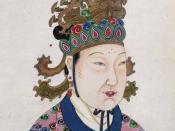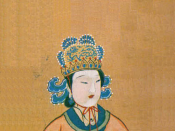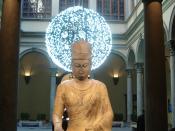Through telling the story of Xiangzi, Lao She's "Rickshaw" moulds a woman in Hu Niu that is the antithesis of everything that a woman should be in the traditional society of that period. In the time-honoured Chinese culture, there has long been a strong prejudice against women of power. Every unfavourable image has been linked with particularly those who have proved especially formidable. Throughout the histories that have been written by mostly men where views as traditional as Xiangzi's have been prevalent, dominant women have been presented in the most unsympathetic light.
In similar fashion, our look at the character Hu Niu is relentlessly coloured by Xiangzi's harsh narrative. It is impossible to do a light reading of "Rickshaw" and hope to be presented a face for Hu Niu that is to true to her actual person. Therefore, in order to ensure that our understanding of this distinctive woman is holistic, we must consider two issues: what sort of social influences have manipulated Xiangzi's point of view; and what is Xiangzi's innate character that so overwhelming pre-ordains the way he thinks.
Only after peeling back such layers do we see a depiction of Hu Niu that is not peppered by biases. Only by doing our own commentary on the story do we hear the point of view of who is not talking and what is not being told, and that is the narrative of Hu Niu herself. What we subsequently come to realize is that, due to his wild prejudices, Xiangzi has rejected his best chance of escaping the rickshaw-puller's misfortunes when he rejects Hu Niu.
In the broader sense of the Chinese history, women who have held power have often been blamed as the cause for ruin of an entire dynasty period. Historians have, for example, always blamed the...


